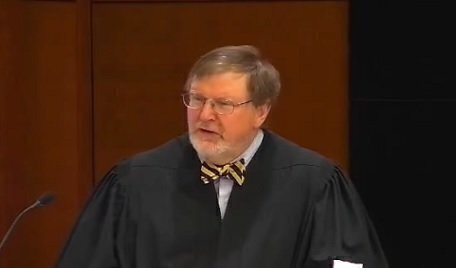The federal judge in Seattle who last month blocked enforcement nationwide of President Trump’s first order to limit immigration from Mideast nations refused on Friday — at least for now — to decide whether to block the revised version of those restrictions.
 In a three-page order that contained implied criticism of lawyers on both sides of the case, U.S. District Judge James L. Robart noted the dispute among the lawyers over whether his prior ruling applied to the new version of the White House executive order, but declined to settle it. He said neither side had made a formal request that would set up such a decision.
In a three-page order that contained implied criticism of lawyers on both sides of the case, U.S. District Judge James L. Robart noted the dispute among the lawyers over whether his prior ruling applied to the new version of the White House executive order, but declined to settle it. He said neither side had made a formal request that would set up such a decision.Robart’s refusal to act for the time being raised the possibility that he would not do so in advance of next Wednesday night, when the second Trump order is scheduled to go into effect. Robart said he would expect to call for new briefs if one side or the other made a formal motion seeking to resolve the new dispute. That could take several days. (It is possible that federal judges elsewhere could act on challenges to the revised order before Wednesday midnight.)
The Trump Administration has taken the view that Judge Robart’s bar to enforcement applied only to the original immigration limits and not to the second one. The states of Washington and Minnesota have argued that the Rohart order remains in effect and does apply to block the new version.
That disagreement arose this past week, after Trump Administration lawyers filed with the judge a copy of the revised order, and told him of the government’s view that it is free to begin enforcing it just after midnight next Wednesday. But that filing made no mention of any request for the judge to act. Responding to that filing, lawyers for the two challenging states asked the judge to uphold their view that the prior order applies in full to the second one. But they filed no specific motion to achieve that result.
Judge Robart on Friday recounted these developments, and commented that “there is no pending motion concerning the foregoing issues.” He then declined to make a decision.
First, he said that he would not do so until one side or the other filed a proper motion, supported by proper briefing. Second, he took note of the fact that lawyers for the two states had promised to file a formal new lawsuit against the revised order by next Wednesday. And, until that is filed, the judge said, he would not decide “the applicability” of his prior order blocking the initial order to the revised version.
Robart noted, pointedly, that his prior order had come in reaction to the initial White House order, because that was the one the two states had contested in their first challenge. That comment seemed to send a signal that the states’ lawyers will have to convince him explicitly that the revised order is as much a violation of the Constitution and federal laws as was the first version, rather than persuading him of the simpler view that he should simply extend the prior ban on enforcement.
The early days of next week thus may be crucial to the outcome of the dispute in the Washington/Minnesota case. That case has already been joined by the state of Oregon, and is also to be joined soon by the states of Massachusetts and New York.
Legendary journalist Lyle Denniston is Constitution Daily’s Supreme Court correspondent. Denniston has written for us as a contributor since June 2011 and has covered the Supreme Court since 1958. His work also appears on lyldenlawnews.com, where this story first appeared.





